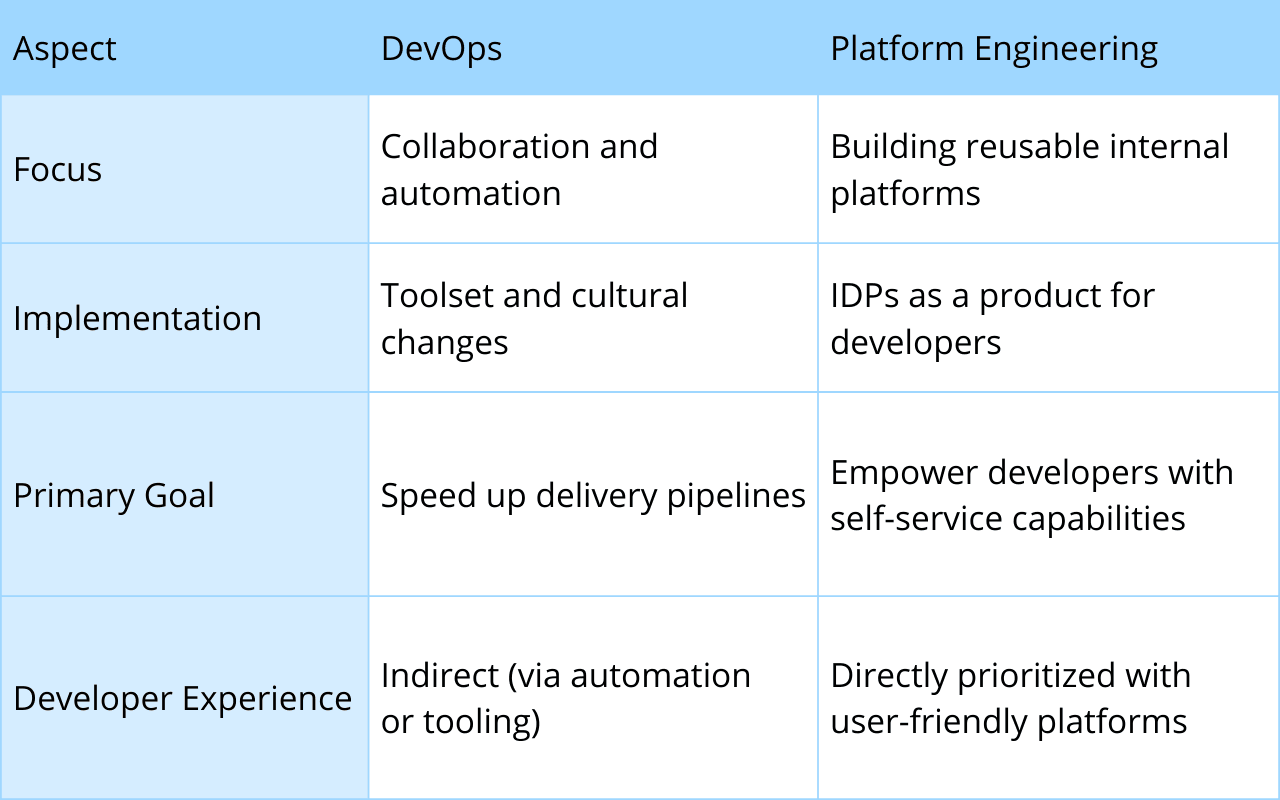
Home / Blog / Technology / Platform Engineering – Evolution of DevOps or a Revolution?
Platform Engineering – Evolution of DevOps or a Revolution?
The tech world never stands still, and fresh approaches keep appearing to handle the increasing complexity of software development. One such approach is Platform Engineering - a concept gaining traction among organizations looking to streamline operations and improve developer experience. But is Platform Engineering a natural evolution of DevOps, or does it represent a radical shift? Let’s see what Platform Engineering is, how it differs from traditional DevOps, the benefits of Internal Developer Platforms (IDPs), and a real-world case study of its implementation.
What is Platform Engineering?
Platform Engineering focuses on building and maintaining Internal Developer Platforms (IDPs) - customizable and reusable systems that developers can use to self-serve their infrastructure needs. Instead of relying on ad-hoc solutions or direct intervention from DevOps teams, developers can access pre-configured tools and workflows tailored to their specific requirements.
At its core, Platform Engineering aims to:
- Enhance developer productivity by reducing operational friction.
- Standardize infrastructure processes to ensure consistency.
- Bridge the gap between development and operations with a focus on scalability and usability.
How Does Platform Engineering Differ from DevOps?
While DevOps revolutionized software delivery by breaking down silos between development and operations, Platform Engineering takes the concept a step further. Here's how they differ:

DevOps remains foundational, but Platform Engineering reshapes its operational aspects into a more product-driven approach.
Benefits of Internal Developer Platforms (IDPs)
The introduction of IDPs brings tangible benefits, especially for organizations dealing with complex systems:
- Improved Developer Productivity: Developers can quickly access the resources they need without waiting for operational support.
- Consistency Across Environments: Pre-defined templates ensure infrastructure remains uniform across teams and projects.
- Cost Optimization: Streamlined processes reduce operational overhead and unnecessary resource usage.
- Enhanced Scalability: Platforms are designed with growth in mind, making it easier to onboard new teams or projects.
- Better Developer Experience: A user-friendly platform reduces frustration and enables developers to focus on building features rather than troubleshooting infrastructure issues.
A Case Study: Implementing Platform Engineering
Company X (a mid-sized SaaS provider) faced significant challenges as their development teams grew. Traditional DevOps practices worked initially but soon became a bottleneck. Developers often had to wait days for access to resources, and maintaining consistency across projects was becoming increasingly difficult.
The Solution:
Company X decided to implement an IDP. The platform offered:
- Self-service access to Kubernetes clusters and CI/CD pipelines.
- Pre-configured templates for deploying microservices.
- A centralized dashboard for monitoring and logging.
The Results:
- Deployment times dropped by 50%.
- Developer satisfaction scores increased by 40%.
- Operational incidents due to misconfigurations decreased by 70%.
By treating their internal platform as a product and engaging developers during the design phase, Company X ensured adoption and maximized its impact.
Is Platform Engineering the Future?
Platform Engineering doesn’t replace DevOps - it complements and evolves it. As organizations grow and systems become more complex, the need for structured, reusable internal platforms will continue to rise. For companies looking to scale efficiently while keeping developers happy, adopting Platform Engineering might not just be an option - it could be a necessity.
If your organization is struggling with bottlenecks in operations or inconsistent infrastructure, now might be the perfect time to explore Platform Engineering. It could be the next step in your journey toward operational excellence.
Author
Paulina Pichnor
Content Writer
Not sure what tech to choose?
Reach out to aur executive consultants for personalized guidance on how best to approach your project